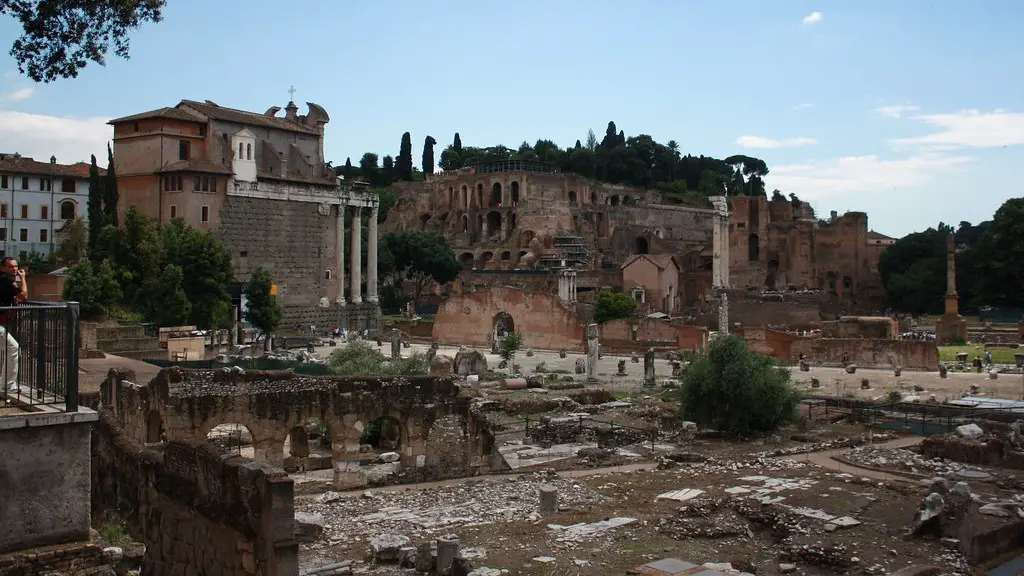Understanding the Meaning of Life in Ancient Rome
It’s an age-old question that we still grapple with today: what is the meaning of life? For Romans in the ancient world, there were several different answers – with many of their attitudes hinged on the idea of living in honor. Ancient Romans were eager to fulfill their duties to family, state, andthe gods in the hopes of becoming respected and thus, achieving eternal glory.
The ancient Roman life was a mixture of both blessings and hardships, with fate often being a major determinant. Non-nobles had a greater degree of personal freedom than in other ancient cultures, while a combination of strong laws and customs controlled the lives of citizens across all ranks of society. The concept of honor, or ‘gloria’, was especially important to the Romans and helped to define what it meant to be part of a noble family.
To Romans, the foundation of this concept of honor was firstly found in the family. Many Roman fathers had absolute power over family members, so to live a life with honor was to abide by the head of the household and ‘observe religious and moral obligations to his ancestors and family’. Additionally, Roman citizens believed in the power of their gods, as each citizen was devoted to fulfilling the religious obligations from birth. Beyond that, Romans also sought to honor their state, which meant engaging in the politics of the time period in order to ‘obtain an office or other distinction in the service of the state’.
But why was it important for the Romans to seek honor? Essentially, by living an honorable life, they would become respected by their peers, as well as by their gods. One Roman writer provides a clear description of this goal: “Whoever strives most eagerly tofulfill his share of important tasks, making it his priority to win glory and distinction in everything that he does and achieves–he alone can lay claim to true life”. This demonstrates how the ancient Roman concept of earning glory, or ‘fama’, was intertwined with the pursuit of honor and was something citizens strived to attain.
By taking it upon themselves to abide by the laws and customs of their society, Romans also sought to please their gods, as doing so would ensure their place in eternity. The belief was that if all religious and moral obligations were taken care of, then the gods would reward one’s soul with immortality. This would occur in the afterlife, which for the Romans was believed to be an alternate earthly life, full of everlasting glory.
In conclusion, the ancients Romans believed that a life with honor was paramount, as it would lead to glory and recognition – both of which were necessary in order to reach eternity. A life of honor not only meant being devoted to the gods and one’s family, but also striving for distinction in the state. The Romans sought to become respected and immortal, and believed that working towards these goals was essential in order to live a life that was truly meaningful to them.
Strategies for Achieving Roma Honor
For the ancient Romans, living in accordance with their moral and religious obligations was essential in order to achieve honor and thus, live a meaningful life. To this end, there were certain strategies for gaining and even furthering one’s glory. Honourable behavior and recognition from the state were two of the most important, with the latter being especially meaningful.
The state had several annual festivals and events which were a great opportunity to publically display one’s achievements and contributions to society. This could be done through a variety of methods such as public celebrations and competitions. Additionally, Romans could also gain fame through military action, as success in battle usually led to great reward and recognition.
Another way to gain glory was through influential roles within society. Ancient Rome was highly structured, and as such, ithad several different levels of government. Serving in these positions of authority garnered one great respect from their peers and provided them with a level of celebrity. This was one of the most prominent ways for Roman citizens to obtain glory and thus, fully live the honoured life.
In addition to the strategies mentioned above, Romans also strived to be a part of great cultural advancements. As Rome was a highly religious state, citizens needed to prove to the gods that they were ready for immortality. Art, architecture, engineering, and literature were a few of the fields in which one could become a leader, thus achieving fame and displaying their readiness for eternal glory.
By employing some of these strategies, Romans believed they could become respected and recognized in their society, paving the way to become immortal. Thus, honour was the foundation of a meaningful life, and those that were able to master its tenets were well on their way to becoming eternal.
Honourable Death in Ancient Rome
The Romans saw death as the ultimate expression of honor, and its importance permeated the ancient Roman culture. Gaining fame in life was the first step towards achieving honor, but without the culminate death to complete the cycle, it would all be meaningless. For this reason, Roman citizens did their utmost to ensure that they would sustain a dignified death, as it was viewed as an opportunity to display greatness.
The funeral was the primary mechanism for doing this, as it was here where one’s memory could be kept alive through commemoration and offerings. Mourners were expected to show their respect to the deceased by paying tribute, while elaborate funereal processions were often held to ensure the departed was endowed with honor.
Another way in which the Romans consecrated death was through symbolic rituals. Ancient Rome had several religious ceremonies relating to death, which included libations and multiple sacrifices. Citizens believed that offering up these items would appease the gods and bring about a peaceful afterlife for the departed.
For the Romans, death was not an end, but instead, a transition from one life to the next. By preparing and honouring a person before their passing, those who survived them could be assured that the deceased was well on their way to the afterlife with their legacy intact. Death was thus seen as a necessary part of life, one which provided the ultimate opportunity for glory.
The Pursuit of Pleasure in Ancient Rome
Though ancient Romans were focused on more abstract and spiritual values, they still strove to find pleasure in life. Rome was an incredibly wealthy and powerful state, so citizens had access to desirable commodities. Pleasure could be found at public spectacles such as the Colosseum and the Circus Maximus, while dining at the highest quality restaurants and ultimate banquets was a default in Roman life.
Romans also enjoyed a variety of leisure activities, such as going on holidays to nearby cities, engaging in sports, attending theater events, and playing board games. Holidaying away from home was especially popular as it allowed one to seen different sites and observe the culture of foreign lands. Additionally, the wealthy among them had access to luxury items such as rich silk garments and extravagant jewels.
Though pleasure was an important part of living an enjoyable life, the ancient Romans believed that too much of anything was never a good thing. Instead of solely indulging in these joys, Roman citizens instead viewed pleasure as a mere part of their lives. Depositing too much energy in these affairs was too frivolous and meant that one might neglect the more important aspects of life, such as honour.
To the ancient Romans, pursuing pleasure was important, as it helped to form a balanced life. But, it was in no way viewed as the purpose of living, and they instead strived to structure their lives in a way that balanced leisure and honour, so as to live a meaningful and dignified life.
Romans and Their View of Women
Interestingly, the ancient Romans had quite a progressive view when it came to the treatment of women. Generally speaking, females had more freedoms than in most other ancient cultures, and Rome even had certain laws that granted them specific rights. This was in part due to Rome’s patriarchal society, as well as its strong notion of honorable behavior, which benefitted both sexes.
For example, although many men had authority over women, their daughters nonetheless had certain advantages. Daughters in ancient Rome were allowed to own property and gain inheritance after their fathers, while those from higher class households were even educated. It was also the mother’s duty to raise her children and teach them to adhere to religion and morals, and thus, ensure they could live an honorable life.
As a result, although Roman women were not viewed as equals to men, they did possess more rights than in many other ancient societies. Women of a lower class had the right to divorce, while those of high class could even serve in public office. Furthermore, women of all kinds were free to participate in their own familial rituals and celebrations, such as funerals and weddings, which was something that was simply unheard of in many other cultures.
All in all, the Romans believed that living a dignified life was the key to lasting honor, and that this should be applied to both men and women without prejudice. Women played a significant role in Roman culture and her involvement in some affairs was even encouraged, so long as veneration of one’s family and state remained paramount.
Ancient Roman Virtues
The concept of virtue played a large part in Roman culture, as it was believed to be key in maintaining a life with honor. To the ancient Romans, a virtuous life was synonymous with an honorable life, as they were intertwined in their societal beliefs. Rome had several virtues which were stressed from the family level, and up, especially in regards to religion and the state.
Integrity and dignity were two of the main values that the Romans adhered to, as citizens were eager to protect the dignitas of their families. Additionally, humility and respect for the gods were expected of all Romans, as failure to abide could lead to dire consequences. Fidelity to the state and its citizens was also a core belief, with service to the state and its people being a primary emblem of honor.
Aside from the more prominent virtues, Rome lauded a few less mainstream values. Chastity and piety were highly regarded, while an admiration of speech and knowledge was also viewed favorably. It was believed that the cultivation of these values would lead to glory and recognition in the state and help one to becomeimmortal upon their death.
Ultimately, virtue played a key role in the lives of the ancient Romans, as it enabled them to live a life with honor. By adhering to both mainstream and lesser-known values, Roman citizens were more likely to become respected and thus, more able to reach eternal life. To the ancient Romans, this was the pinnacle of a meaningful life, and the virtues that helped to achieve it were essential in ensuring the preservation of honors and lasting glory.





